
Photo via Getty Images.
Jan. 7, 2025 By Richard Khuzami
The lack of affordable housing in America is not a simple issue. It has many layers that must be addressed.
Today, developers are often portrayed as villains, prioritizing profit over the community. However, underpinning all decisions developers make is access to funding, and in this way, lenders, whether private or public, are often actually pulling the strings.
While we are all aware of banks, there are also private lenders that play an important role. These include union pension funds, private equity firms and real estate investment trusts (REITs). They are all well-funded and can make or break plans for additional housing, especially affordable housing.
Often, developers will have every intention of working for the betterment of the community by creating innovative, affordable housing. But between reticent lenders and inconsistent government incentives, the best-laid plans often disappear. We are not naïve and know there are developers who have no concern for the community, only profit. But as a Land Use board member in Queens, I have seen many presentations by developers with creative plans for affordable housing disappear when the numbers don’t add up. Perhaps they could not get funding or promised government incentives to disappear with changes in the political climate. In that case, either nothing gets built and the site lies fallow for years, or they end up building market-rate buildings the lenders will fund.
No sector of our society today is more profitable than our banks and private lenders. Their clout gives them substantial influence over the housing market. But with that should come a responsibility to contribute to everyone’s quality of life, not just to stockholders. Not only should they fund developers who go to them with “less profitable” affordable housing, but they should also initiate affordable housing projects themselves. When they refuse to finance projects, especially those with affordable housing, they add fuel to the storm that has put the American Dream out of reach for most Americans. They need to take responsibility!
There is precedent: Banks have responsibilities under the Community Reinvestment Act (CRA), which encourages them to meet the credit needs of the communities in which they operate, including low- and moderate-income neighborhoods. These responsibilities are mandatory, but there is room for expansion. Also, stricter enforcement is needed to ensure compliance.
As far as private lenders, we should look to create a CRA-like program that encourages them to become part of the solution in the housing crisis. Since they are regulated by different entities, this may be complicated, but perhaps some government incentives could be created that would help justify positive actions on their part.
There has been a proposal by the new Trump administration to reduce the requirement for liquidity that each bank must maintain. These requirements were brought in after the 2008 fiscal crisis to ensure banks do not have to be bailed out to survive such a calamity. We propose, however, that any funds made available because of the reduction in liquidity requirements must be utilized to support the creation of housing, especially affordable housing. We do not believe the money should be used for stock manipulation, the salaries of bank officials, and other transactions that do not work directly to alleviate our societal problems. They must be used to help create the quality of life and opportunities for all Americans.
We need banks and private lenders to embrace a mission that enhances everyone’s quality of life. They need to initiate or finance many more affordable housing projects. With this, we can look forward to a more equitable society. Affordable housing frees up capital that starts new businesses and funds education that encourages class mobility. If we continue to follow the current path, we could lose the drive and inventive spirit that is uniquely American, where you can rise to any height regardless of where you start. This would be an immeasurable loss.
*Richard Khuzami is the President of the Old Astoria Neighborhood Association.
